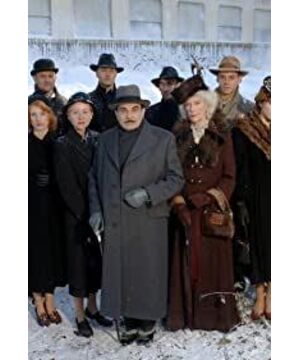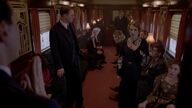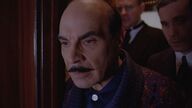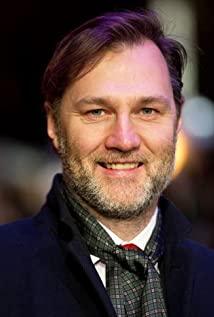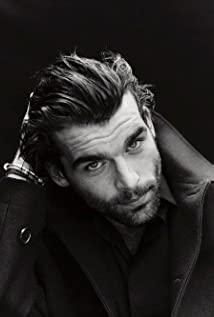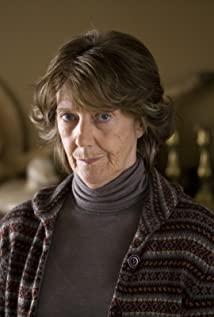So far I have watched 4 versions: 1974, 2001, 2010, and 2017. Because this is a well-known story, the four versions basically follow the original in the overall plot. But in some specific details, the four directors gave their own understanding. Among the four versions, the 2010 Cassetti is quite special. In the original book, as well as in the other three versions, Cassetti is arrogant and domineering, a person who does not repent, and his demeanor is dominated by exposed ferocity. In the 2010 version, the director made Cassetti feel fearful. Among the daily expressions, Cassetti in 2010 is also dominated by gloomy and vicious eyes, and there is no such exaggerated ferocity. Maybe Cassetti is still vicious, but his fear is palpable, maybe the fear of being threatened, maybe it is. . . Regret? In short, when no one was there, before going to sleep, he revealed his fears to God. Cassetti prayed with Poirot, Poirot said please accept my goodness and Cassetti said please forgive my sins. Moreover, only in the 2010 version, Cassetti was executed by 12 people in a basically sober state. In other versions, the pills were taken, they were in a lethargic state, or they were only awake for a while. However, in the 2010 story, Cassetti felt every cut. In this version of the story, the director gave Cassetti the greatest punishment, from spirit to body. Another big change is the processing at the end. In the original book, at the end, Poirot gave two conclusions, he asked Booker to choose one, Booker chose the first, and Poirot readily agreed. In both the 2017 and 1974 versions, the ending of the original work is completely reproduced. At the end of 2010, Poirot did not agree with the private trial of these 12 people at the beginning, and he had a fierce conflict with everyone. Poirot still insisted that the law, even if it was unfair, still had to be obeyed. That is, Bouquet agreed to the trial of the people, but Poirot still insisted on obeying the law. Although the 12 people firmly believed that they were right, they still insisted that they did not hurt Poirot and Booker on the premise that they were about to be handed over to the police. At the beginning, the director set up two things, both about the conflict of justice and rules, to remind Poirot. The first: an officer committed suicide after being exposed by Poirot; and the soldier, on his way to send Poirot to the ship, told Poirot that it was unfair to kill an officer for such a degree of error. the second: On the way to the hotel, a woman in Istanbul was stoned for adultery; and Miss Deben Khan, who met Poirot, once asked Poirot if it was fair; Poirot was firm in both cases The answer should follow the rules. But, after the third conflict of justice and rules, Poirot pondered for a night after learning the cause and effect of what happened, after understanding the background of each person and the reasons for their participation. Finally, the fact that the police arrived in the early hours of the morning told the police another conclusion. At the end of the film, Poirot looked back at the crowd once, and then walked into the distance alone against the wind and snow. In this event, Poirot chose justice over rules. Completely violated his principles. The background music is intense and frantic, and Poirot's eyes are excited, even painful. Poirot's mood at this time should be beyond words. The director uses three stories, in a progressive way, to give reasons why Poirot finally makes a choice that is inconsistent with his detective status. This kind of setting seems to be inconsistent with the original work, whether this adaptation is good or not, everyone's understanding is different. However, from the perspective of the plot of a movie, this setting will make the character more complete, and the logic of the character's mood change becomes reasonable. The difference between a movie and a novel is that some of the audience of the movie have not read the original book. They don’t know much about the characters. They have no preconceived ideas about the characters in their hearts. Readers of the novel can understand the change of characters through the series of novels, or the author's perspective of God in the novel. But moviegoers have no other information. For this story, it is not impossible to directly take the ending of the original work. However, it is actually not helpful for the shaping of the character of Poirot. Audiences who don't know the original work, after watching this ending, will feel that the ending is rushed and there is no aftertaste. Just, I feel, movies and novels are indeed quite different. Watching one version alone will not give you a great feeling. Watching the adaptations of multiple directors in a row will understand their intentions. There will be a little feeling about the adaptation of this matter. But, after the third conflict of justice and rules, Poirot pondered for a night after learning the cause and effect of what happened, after understanding the background of each person and the reasons for their participation. Finally, the fact that the police arrived in the early hours of the morning told the police another conclusion. At the end of the film, Poirot looked back at the crowd once, and then walked into the distance alone against the wind and snow. In this event, Poirot chose justice over rules. Completely violated his principles. The background music is intense and frantic, and Poirot's eyes are excited, even painful. Poirot's mood at this time should be beyond words. The director uses three stories, in a progressive way, to give reasons why Poirot finally makes a choice that is inconsistent with his detective status. This kind of setting seems to be inconsistent with the original work, whether this adaptation is good or not, everyone's understanding is different. However, from the perspective of the plot of a movie, this setting will make the character more complete, and the logic of the character's mood change becomes reasonable. The difference between a movie and a novel is that some of the audience of the movie have not read the original book. They don’t know much about the characters. They have no preconceived ideas about the characters in their hearts. Readers of the novel can understand the change of characters through the series of novels, or the author's perspective of God in the novel. But moviegoers have no other information. For this story, it is not impossible to directly take the ending of the original work. However, it is actually not helpful for the shaping of the character of Poirot. Audiences who don't know the original work, after watching this ending, will feel that the ending is rushed and there is no aftertaste. Just, I feel, movies and novels are indeed quite different. Watching one version alone will not give you a great feeling. Watching the adaptations of multiple directors in a row will understand their intentions. There will be a little feeling about the adaptation of this matter. But, after the third conflict of justice and rules, Poirot pondered for a night after learning the cause and effect of what happened, after understanding the background of each person and the reasons for their participation. Finally, the fact that the police arrived in the early hours of the morning told the police another conclusion. At the end of the film, Poirot looked back at the crowd once, and then walked into the distance alone against the wind and snow. In this event, Poirot chose justice over rules. Completely violated his principles. The background music is intense and frantic, and Poirot's eyes are excited, even painful. Poirot's mood at this time should be beyond words. The director uses three stories, in a progressive way, to give reasons why Poirot finally makes a choice that is inconsistent with his detective status. This kind of setting seems to be inconsistent with the original work, whether this adaptation is good or not, everyone's understanding is different. However, from the perspective of the plot of a movie, this setting will make the character more complete, and the logic of the character's mood change becomes reasonable. The difference between a movie and a novel is that some of the audience of the movie have not read the original book. They don’t know much about the characters. They have no preconceived ideas about the characters in their hearts. Readers of the novel can understand the change of characters through the series of novels, or the author's perspective of God in the novel. But moviegoers have no other information. For this story, it is not impossible to directly take the ending of the original work. However, it is actually not helpful for the shaping of the character of Poirot. Audiences who don't know the original work, after watching this ending, will feel that the ending is rushed and there is no aftertaste. Just, I feel, movies and novels are indeed quite different. Watching one version alone will not give you a great feeling. Watching the adaptations of multiple directors in a row will understand their intentions. There will be a little feeling about the adaptation of this matter. The director uses three stories, in a progressive way, to give reasons why Poirot finally makes a choice that is inconsistent with his detective status. This kind of setting seems to be inconsistent with the original work, whether this adaptation is good or not, everyone's understanding is different. However, from the perspective of the plot of a movie, this setting will make the character more complete, and the logic of the character's mood change becomes reasonable. The difference between a movie and a novel is that some of the audience of the movie have not read the original book. They don’t know much about the characters. They have no preconceived ideas about the characters in their hearts. Readers of the novel can understand the change of characters through the series of novels, or the author's perspective of God in the novel. But moviegoers have no other information. For this story, it is not impossible to directly take the ending of the original work. However, it is actually not helpful for the shaping of the character of Poirot. Audiences who don't know the original work, after watching this ending, will feel that the ending is rushed and there is no aftertaste. Just, I feel, movies and novels are indeed quite different. Watching one version alone will not give you a great feeling. Watching the adaptations of multiple directors in a row will understand their intentions. There will be a little feeling about the adaptation of this matter. The director uses three stories, in a progressive way, to give reasons why Poirot finally makes a choice that is inconsistent with his detective status. This kind of setting seems to be inconsistent with the original work, whether this adaptation is good or not, everyone's understanding is different. However, from the perspective of the plot of a movie, this setting will make the character more complete, and the logic of the character's mood change becomes reasonable. The difference between a movie and a novel is that some of the audience of the movie have not read the original book. They don’t know much about the characters. They have no preconceived ideas about the characters in their hearts. Readers of the novel can understand the change of characters through the series of novels, or the author's perspective of God in the novel. But moviegoers have no other information. For this story, it is not impossible to directly take the ending of the original work. However, it is actually not helpful for the shaping of the character of Poirot. Audiences who don't know the original work, after watching this ending, will feel that the ending is rushed and there is no aftertaste. Just, I feel, movies and novels are indeed quite different. Watching one version alone will not give you a great feeling. Watching the adaptations of multiple directors in a row will understand their intentions. There will be a little feeling about the adaptation of this matter.
View more about Murder on the Orient Express reviews


